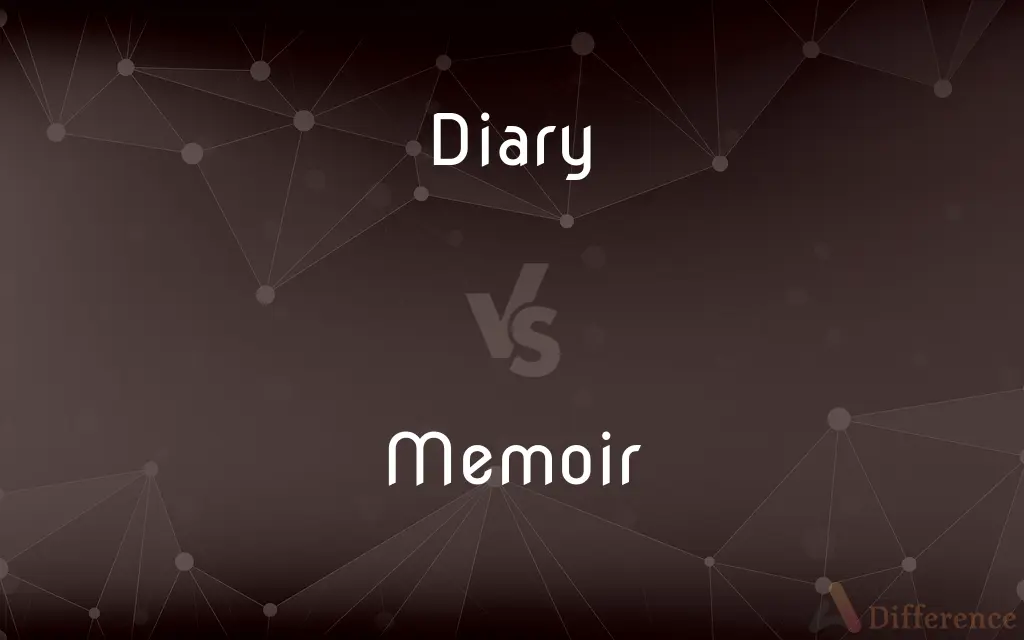Diary vs. Memoir — What's the Difference?
By Fiza Rafique & Urooj Arif — Updated on March 13, 2024
A diary is a daily record of personal experiences and thoughts, while a memoir is a collection of memories that an individual writes about moments or events, both public and private, from their life.

Difference Between Diary and Memoir
Table of Contents
ADVERTISEMENT
Key Differences
Diaries are written contemporaneously, capturing daily thoughts, events, and feelings as they occur. This real-time reflection makes diaries intimate and immediate, providing a window into the author's day-to-day life. Memoirs, on the other hand, are written from a later point in time, offering a reflective and curated perspective on past events. This hindsight allows memoirs to explore themes, insights, and understandings that may not have been apparent in the moment.
While diaries often serve as a personal outlet, with no intended audience other than the author, memoirs are written for public consumption, sharing the author's life stories and lessons learned with others. This difference in audience significantly influences the content, style, and purpose of the writing. Diaries may contain mundane details or unfiltered thoughts, whereas memoirs are typically more structured and narrative-driven, focusing on engaging and meaningful storytelling.
Diaries and memoirs differ in their scope and selectivity. A diary may cover a wide range of topics, from trivial daily activities to significant life events, without a specific focus. In contrast, a memoir usually centers around a particular theme, period, or series of events in the author's life, selectively highlighting experiences that relate to the overarching narrative or message.
The process of writing a diary versus a memoir also reflects their distinct purposes. Diary writing is often spontaneous and cathartic, a way to process the day's events or cope with emotions. Memoir writing, however, is a more deliberate act of memory and storytelling, requiring the author to reflect on their past, identify key themes or lessons, and craft a compelling narrative that resonates with readers.
Comparison Chart
Purpose
Personal record of daily life
Reflective narrative of life experiences
ADVERTISEMENT
Audience
Intended for the author's eyes only
Intended for public readership
Timing
Written contemporaneously
Written with the benefit of hindsight
Content
Unfiltered thoughts, various events
Curated stories, thematic focus
Scope
Daily details, no specific focus
Selective, centered around themes or periods
Style
Spontaneous, informal
Structured, narrative-driven
Writing Process
Cathartic, immediate
Reflective, crafted
Compare with Definitions
Diary
A personal record of daily activities, thoughts, and feelings.
She kept a diary during her travels to document every new experience.
Memoir
A literary work that explores the self.
The memoir combines humor and wisdom to convey life's complexities.
Diary
An intimate journal of life events.
Her diary served as a companion through many ups and downs.
Memoir
A thematic narrative focusing on significant events.
The memoir delves into the challenges and triumphs of his career in science.
Diary
A daily log for personal use.
His diary was filled with notes and sketches of the landscapes he saw.
Memoir
A reflective account of personal history.
In his memoir, he reflects on the lessons learned from decades of teaching.
Diary
A private space for self-expression.
He used his diary to explore his thoughts and dreams.
Memoir
A public sharing of private life lessons.
Her memoir offers insights into overcoming adversity with grace and resilience.
Diary
A chronological account of daily life.
The diary entries began with the mundane and evolved into profound reflections.
Memoir
A collection of memories about the author's life experiences.
Her memoir recounts her journey from a student activist to a seasoned politician.
Diary
A diary is a record (originally in handwritten format) with discrete entries arranged by date reporting on what has happened over the course of a day or other period. A personal diary may include a person's experiences, thoughts, and/or feelings, excluding comments on current events outside the writer's direct experience.
Memoir
A memoir (; from French: mémoire: memoria, meaning memory or reminiscence) is any nonfiction narrative writing based in the author's personal memories. The assertions made in the work are thus understood to be factual.
Diary
A book in which one keeps a daily record of events and experiences.
Memoir
An account of the personal experiences of an author.
Diary
A usually daily written record of personal experiences and observations; a journal.
Memoir
Often memoirs An autobiography.
Diary
A book or computer file used for keeping such a record.
Memoir
A biography or biographical sketch.
Diary
A daily log of experiences, especially those of the writer.
They kept separate diaries. His was on paper and her diary was on her computer's hard drive.
Memoir
A report, especially on a scientific or scholarly topic.
Diary
A personal organizer or appointment diary.
Memoir
Memoirs The report of the proceedings of a learned society.
Diary
(obsolete) Lasting for one day.
Memoir
An autobiography; a book describing the personal experiences of an author.
When I retire, I'm going to write my memoirs.
Diary
(intransitive) To keep a diary or journal.
Memoir
A biography; a book describing the experiences of a subject from personal knowledge of the subject or from sources with personal knowledge of the subject.
James wrote a memoir of his grandmother shortly after she passed away.
Diary
A register of daily events or transactions; a daily record; a journal; a blank book dated for the record of daily memoranda; as, a diary of the weather; a physician's diary.
Memoir
Any form of narrative describing the personal experiences of a writer.
Diary
Lasting for one day; as, a diary fever.
Memoir
A memorial account; a history composed from personal experience and memory; an account of transactions or events (usually written in familiar style) as they are remembered by the writer. See History, 2.
Diary
A daily written record of (usually personal) experiences and observations
Memoir
A memorial of any individual; a biography; often, a biography written without special regard to method and completeness.
Diary
A personal journal (as a physical object)
Memoir
An account of something deemed noteworthy; an essay; a record of investigations of any subject; the journals and proceedings of a society.
Memoir
An account of the author's personal experiences
Memoir
An essay on a scientific or scholarly topic
Common Curiosities
Is it necessary for a diary to be written daily?
While diaries are often associated with daily entries, it's not strictly necessary; some people write in their diaries intermittently, whenever they feel the need or desire to document their thoughts or experiences.
Why do people write memoirs?
People write memoirs to share their life experiences, lessons learned, and personal insights with a wider audience, often with the aim of inspiring, educating, or entertaining others.
Are memoirs always written by the people they are about?
Yes, memoirs are personal narratives written by the individuals who experienced the events they describe, offering a firsthand perspective on their lives.
What makes a memoir compelling to read?
A compelling memoir combines honest reflection, engaging storytelling, and meaningful insights, connecting the author's personal experiences to universal themes.
What is the primary purpose of keeping a diary?
The primary purpose of a diary is to serve as a personal record of daily life, capturing thoughts, feelings, and events as they happen.
Can diary entries be included in a memoir?
Yes, diary entries can be used in a memoir to provide authentic snapshots of the author's past thoughts and experiences.
Can a diary become a historical document?
Yes, diaries can become valuable historical documents, providing intimate insights into daily life and events from the author's time period.
How does a memoir differ from an autobiography?
A memoir focuses on specific themes, stories, or periods in the author's life, offering reflections and insights, while an autobiography provides a comprehensive history of the author's life from birth to the present.
How do memoirs contribute to literature?
Memoirs contribute to literature by offering deeply personal stories that reveal broader truths about the human experience, enriching readers' understanding of diverse lives and perspectives.
Is it common for authors to fictionalize aspects of their memoirs?
While memoirs are based on true stories, authors may use literary techniques to enhance storytelling, but significant fictionalization risks undermining the memoir's authenticity.
Share Your Discovery

Previous Comparison
Opal vs. Quartz
Next Comparison
Randomised vs. RandomizedAuthor Spotlight
Written by
Fiza RafiqueFiza Rafique is a skilled content writer at AskDifference.com, where she meticulously refines and enhances written pieces. Drawing from her vast editorial expertise, Fiza ensures clarity, accuracy, and precision in every article. Passionate about language, she continually seeks to elevate the quality of content for readers worldwide.
Co-written by
Urooj ArifUrooj is a skilled content writer at Ask Difference, known for her exceptional ability to simplify complex topics into engaging and informative content. With a passion for research and a flair for clear, concise writing, she consistently delivers articles that resonate with our diverse audience.











































